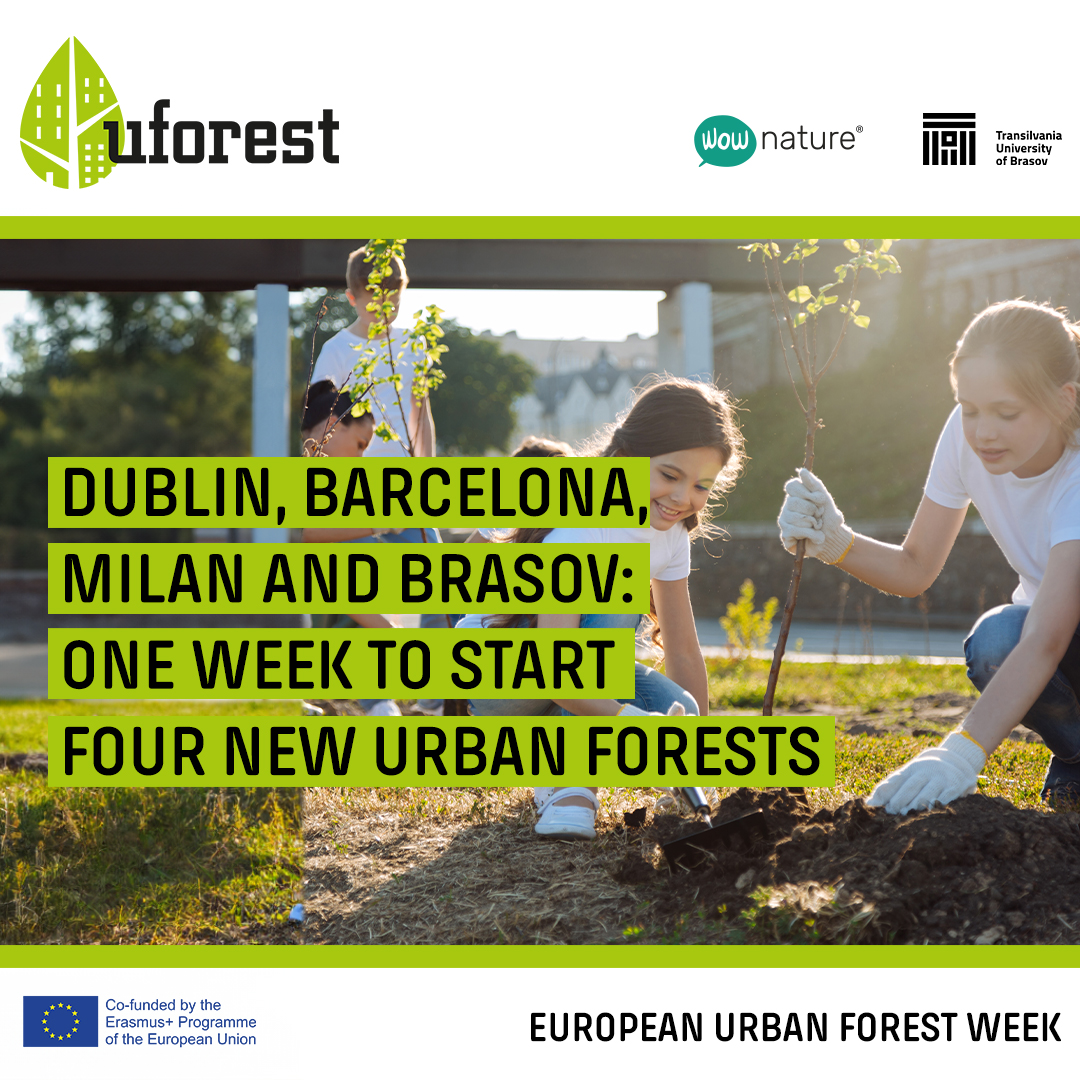European Urban Forest Week

4 - 10 December 2023
European Urban Forest Week - Dublin, Barcelona, Milan and Brasov: one week to start four new urban forests
In the first week of December 2023, 4 tree planting events will take place in 4 different major European cities. During the European Urban Forest Week, Dublin, Milan, Barcelona and Brasov will launch innovative projects to create new urban green spaces, with the aim to improve the quality of life of the people who live in them. The action is part of a long process included in the European project Uforest. Bringing public organisations, businesses and universities together, Uforest promotes innovation and entrepreneurship in urban forestry to contribute to the development of greener and healthier cities.
The European Urban Forest Week is carried out in collaboration withwownature.eu, a web platform Etifor to connect forest managers, public and private organisations and citizens.
With 84% of the European population expected to live in urban areas by 2050, planning more sustainable and liveable cities is crucial. Urban forests provide efficient solutions to many of the challenges posed by increasing urbanisation and climate change. For example, they can reduce the urban heat island effect, provide better air quality, and increase biodiversity. However, too often the implementation of these solutions finds a lot of barriers. Against this background, Uforest was born to provide better information about and training in urban forestry to students and professionals. Through its events, learning opportunities and workshops, the project was able to involve more than 1,000 people across the world. But Uforest is not just theory: to prove that urban forests are an efficient solution, the project will create 4 new urban forests in 4 different European cities. Each urban forest was designed to respond in an innovative way to the specific needs of the different local communities:
- Climatic refugia in Barcelona - Heat waves are increasingly hitting Europe, and especially its Mediterranean areas. In this context, cities are particularly vulnerable because of the already known urban heat island effect. Urban forestry solutions can help address the increasing heat in Mediterranean cities, by providing shade and cooling streets. The climatic refugia in Barcellona is developed in collaboration with theUniversitat Autònoma de Barcellonaand the students of the Uforest Specialization School, as part of the Uforest Innovation Challenge. Divided into groups, students developed their own project for a climatic refugia, responding to the specific needs of the city.
- Smart-tech forest in Brasov - Developed in collaboration with the Transilvania University of Brasov, the Smart-tech forest will be planted in the area surrounding the city of Brasov, in Romania. This new urban forest will contain oaks, maples, ash trees, and wild cherry trees: a natural mix of species that will increase biodiversity and provide shelter and food to many animals. So what makes it a smar-tech forest? Different sensors will be installed to monitor the benefits of trees on air, climate and landscape. The main sensor will be meteorological, pedological and spectral and will provide useful data for the management of the forest.
- The Darndale Donut in Dublin - In Darndale, a district in the north of Dublin, Uforest and Trinity College Dublin wanted to create an urban forest able to provide social and health benefits, and not only environmental ones. In this sense, the Darndale Donut aims at supporting the local community by improving the wellbeing and health of citizens, while enhancing social inclusion, cohesion and equity. For this reason, the community of Darndale will be directly involved in the tree planting activity and in the future maintenance of the forest. The Darndale Donut will be composed of 3000 native species, such as oaks, birch, willow and hazel, planted in the shape of a donut.
- A tiny forest for huge benefits in Milan - Based on the work of the Japanese botanist Akira Miyawaki, tiny forests are small-scale forests that can bring the benefits of large green spaces. By planting many different species very close together, this method can create fast-growing forests in degraded lands: a perfect solution for the area in Cernusco sul Naviglio! In collaboration with the Politecnico di Milano and Forestami, Uforest will plant one tiny forest to provide environmental and health benefits in this highly industrialized area outside of Milan.
The European Urban Forest Week marks the beginning of a greener future. While the events will take place only over 7 days, their impact will be prolonged year after year. The new urban forests will remain to their communities, providing environmental, social and health benefits to present and future generations.
Uforest is a Knowledge Alliance project co-funded by the Erasmus+ Programme of the European Commission. The project is promoted by the ERSAF, Politecnico di Milano, Etifor, European Forest Institute (EFI), Universidad Autónoma de Barcelona, CREAF, Agresta, Transilvania University of Brasov, Forest Design, Trinity College Dublin, Nature Based Solutions Institute, Green City Watch.



